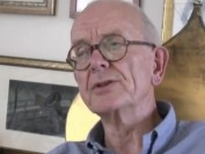Professor Henry Marsh

Brief Outline:
Henry Marsh talks about issues to be considered when thinking about neurosurgery on severely injured patients
Background:
Henry Marsh is a consultant neurosurgeon and author of 'Do No Harm: tales of life, death and brain surgery'.
More about me...
Henry Marsh talks about how he asks families to consider what the patient themselves would want.
Henry Marsh talks about how he asks families to consider what the patient themselves would want.
SHOW TEXT VERSION
PRINT TRANSCRIPT
Henry Marsh explains his view that neurosurgeons need to become more aware of the negative outcomes of intervention and reflects on uncertainty.
Henry Marsh explains his view that neurosurgeons need to become more aware of the negative outcomes of intervention and reflects on uncertainty.
SHOW TEXT VERSION
PRINT TRANSCRIPT
Is there a way that could be made to happen? That you think would be a good idea?
Well I think it should be part of neurosurgical trainees’ education to visit some of the long-term neurodisability units that are scattered around the place. I think one ought to go and see them, just for a visit, to get some idea of what profound brain disability is like. My trainees I think have no idea at all.
The problem from my point of view with that of course is that is that one’s never entirely certain. You always think, “Well, it’s just possible they’ll make a better recovery than I think”. So the question then becomes one of how many bad results justify one good result?
And you never know. And if you say, “I’ll only make a decision if I can be absolutely certain I’m not missing the opportunity to save one person’s good worthwhile result”, you’re running the risk you’ll condemn many patients – and above all their families - to a living hell of having a profoundly disabled relative in long-term care afterwards, which is a terrible state for families to be in.
One does need to have some feel for what happens to many people with severe brain damage and I think on the whole neurosurgeons become increasingly conservative as they get older. I think you’ll find young new consultants are much more enthusiastic about treating everybody than people my age. And it’s partly I think from experience one is more aware of the fact that many patients do very badly.

